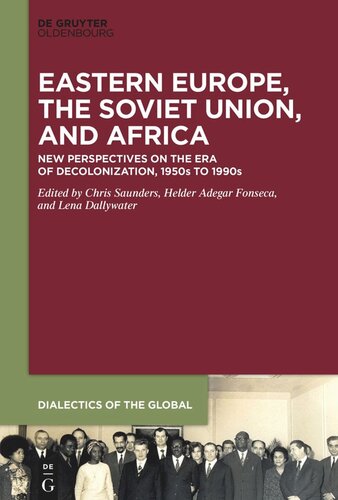

Most ebook files are in PDF format, so you can easily read them using various software such as Foxit Reader or directly on the Google Chrome browser.
Some ebook files are released by publishers in other formats such as .awz, .mobi, .epub, .fb2, etc. You may need to install specific software to read these formats on mobile/PC, such as Calibre.
Please read the tutorial at this link: https://ebookbell.com/faq
We offer FREE conversion to the popular formats you request; however, this may take some time. Therefore, right after payment, please email us, and we will try to provide the service as quickly as possible.
For some exceptional file formats or broken links (if any), please refrain from opening any disputes. Instead, email us first, and we will try to assist within a maximum of 6 hours.
EbookBell Team

4.7
36 reviewsIt is now widely recognised that a Cold War perspective falls short in unfolding the complex geographies of connections and the multipolarity of actions and transactions that were shaped through the movement of individuals and ideas from Africa to the "East" and from the "East" to Africa in the decades in which African countries moved to independence. Adopting an interdisciplinary, transregional perspective, this volume casts new light on aspects of the role of Eastern Europe and the Soviet Union in the decolonisation of Africa. Taking further themes explored in a collection of essays published by the editors in 2019, the twelve case studies by authors from South Africa, Czech Republic, Portugal, Russia, Hungary, Italy, Canada, Serbia, and Germany draw on new sources to explore the history of the ties that existed between African liberation movements and the socialist bloc, some of which continue to influence relationships today. Chapters contribute to three relevant main themes that resonate in a number of scholarly fields of inquiry, ranging from Global Studies, Transregional Studies, Cold War Studies, (Global) History to African Studies, Eastern European, Russian and Slavic Studies: Reconsiderations, Resources, and Reverberations. Drawing upon newly opened archives and combining transregional perspectives with sources in different languages, chapters explicitly point out the shortcomings of past research and debates in the respective field. They highlight new avenues which have been developing and which need to be further developed (Reconsiderations). Selected case studies address the resources of those being active and involved in decolonisation processes, be it in East, North, West and South. They reveal: Which resources (both material and intellectual) are the actors drawing upon? On the other hand: From which resources are individuals on one side or the other reciprocally or intermittently (intentionally) kept away? (Resources). Finally, the third theme puts an emphasis on the historicity of the processes depicted. Studies point to the gaps and dead ends of international support, the paths that peter out, but also to repercussions and reverberations up until today. (Reverberations) Taken these three themes together, the individual chapters contribute to the overall question of: Which general historical narratives about the second half of the 20th century are changing based on these new research findings?